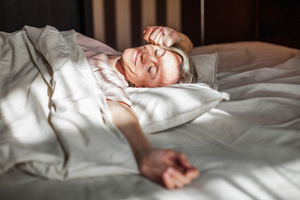Author
Last Updated: January 19, 2026
You might notice something has shifted as you move into your mid 40s and beyond. Maybe your mind is racing when it never used to, or you find yourself feeling jittery, on edge, or overwhelmed by things you could previously brush off. Perhaps you're waking up in the morning with your heart pounding, your thoughts full of worry, or you're snapping at loved ones because you just feel irritable and unsettled.
If this sounds familiar, you're not alone, and what you're experiencing is real. The good news? There's a reason behind it, one rooted in what's happening inside your body as you move through perimenopause or enter menopause, which occurs for women at 51, on average. Understanding what's happening gives you more control, and with the right support, relief is absolutely possible.
What Anxiety in Midlife Can Feel Like
When we think of anxiety, many people imagine worry or panic. But during the menopause transition, the feelings can be more subtle, and therefore harder to recognize as anxiety (4). You might experience a combination of emotional and physical signs that seem to come out of nowhere.
Emotional and mental signs:
- Feeling restless or uneasy, like your brain won't switch off
- Worries or negative thoughts that seem out of proportion or harder to dismiss
- Irritability or feeling short-tempered without your usual triggers
- A sense of dread, or "what if" thoughts that invade your peace
- Trouble concentrating or mental fog that makes you more anxious
Physical and physiological signs:
- Racing heart, tight chest, or palpitations that feel like panic without an obvious cause
- Sweating, flushing, or hot flashes that come alongside or trigger anxious feelings
- Night sweats or disrupted sleep that leave you exhausted and more vulnerable to anxiety
- Stomach upset, dizziness, or tension in your body. Your nervous system feels like it's "on" more often
- Feeling unanchored or like your emotional responses are heightened (things that used to roll off you now linger)
Why this may be confusing: Many of these symptoms overlap with stress, aging, or other life changes, making them easy to dismiss. You might think, "I'm just stressed with work," or "I'm losing control." But here's the key: during perimenopause and menopause, your hormones shift in ways that can directly trigger anxiety. Recognizing that link is the first step toward managing this anxiety.
Sidebar: Anxiety vs. Panic | What's the Difference?
Anxiety: A sustained sense of unease, worry, or hyper-vigilance, often with physical symptoms like a racing heart, tightness, or restlessness.
Panic: A sudden surge of intense fear or terror with strong physical symptoms (heart pounding, sweating, trembling) and a feeling of losing control.
During menopause, you may experience either or both. What matters is recognizing that your body is reacting, and it's not your fault.
The Hormone–Brain Connection
Understanding why anxiety shows up during this transition can feel empowering. Your hormones don't just affect reproduction, they're deeply involved in mood regulation and stress response.
- Estrogen: Your Brain's Mood Stabilizer
Estrogen supports neurotransmitters like serotonin and dopamine, which help you feel calm, happy, and confident. During perimenopause and menopause, estrogen levels fluctuate dramatically and then drop. These fluctuations destabilize your brain's usual mood-buffering system, making you more reactive to stress and more likely to feel the "fight or flight" response (2).
Research shows these hormonal swings are directly linked with anxiety and emotional dysregulation. Less stable estrogen means your body responds to stress more easily.
- Progesterone: Your Natural Calming Agent
Progesterone has a calming effect in the brain through its metabolite allopregnanolone, which acts on the GABA system, your body's main calming neurotransmitter. When progesterone declines during the menopausal transition, this calming influence weakens, making you more vulnerable to anxiety and stress.
The combination of lower progesterone and fluctuating estrogen creates a brain that's more reactive, more sensitized to stress, and less able to quiet itself.
- Cortisol and the Stress Loop
Estrogen also helps regulate cortisol, your body's primary stress hormone. When estrogen drops, cortisol spikes more easily, keeping your nervous system on alert longer than it used to. Add disrupted sleep from hot flashes or night sweats, and you create a feedback loop: poor sleep leads to higher stress reactivity, which increases anxiety, which worsens sleep.
This isn't about you failing to manage stress, it's about your body's changing hormones altering how it responds to stress.
- The Transition Matters: Perimenopause vs. Post-Menopause
Many women assume that once menopause is complete and hormones stabilize at lower levels, things should improve. However, research tells a different story.
Perimenopause is the transition period before menopause (typically lasting 4-8 years) when hormone levels move wildly up and down, creating unpredictability. Studies show that perimenopause, when hormones are fluctuating erratically, is often the highest risk period for new or worsening anxiety (2). Your brain struggles to adapt to these constant ups and downs, leaving your mood regulation system unstable.
If you're in your 40s or early 50s and feeling something new, it likely isn't just life stress. It's probably also hormonal.
The Scope of the Problem
Research confirms that anxiety during menopause is remarkably common. Studies show that between 52% and 65% of menopausal women experience anxiety symptoms (2,3), with the severity ranging from mild to severe. Among those affected, approximately 15-36% experience moderate to severe anxiety that significantly impacts daily functioning (3).
What makes menopausal anxiety particularly challenging is that many women don't realize their symptoms are connected to hormonal changes (4). They may attribute their feelings to stress, aging, or personal failings, when in fact their anxiety has a clear physiological basis.
Finding Relief: Treatments That Target the Cause, Not Just the Symptoms
Now that you understand why anxiety may be showing up, let's explore what you can do, especially treatments that address the underlying hormonal changes.
A. Hormone Replacement Therapy (HRT)
Since your anxiety may be rooted in hormonal shifts, one of the most direct approaches is improving hormonal balance through HRT. While you will likely not regain the hormonal levels you had at 30, you can get the right amount to support your body now.
What is HRT?
Hormone Replacement Therapy means supplementing your body with hormones like estrogen and progesterone (and sometimes testosterone) under careful medical guidance to compensate for what's declining naturally. Since the levels of hormones supplied through a prescription from your healthcare provider are not at the same levels your body produced when you were younger, some clinical organizations prefer the term Menopause Hormone Therapy, but we use HRT as that’s what’s more commonly used
How HRT helps with anxiety:
- Stabilizes mood regulation: By steadying estrogen levels, HRT supports the neurotransmitters that regulate mood. Studies show benefits for mood and anxiety in menopausal women.
- Enhances calm: Progesterone may enhance the calming GABA pathways in your brain, helping you feel less on edge.
- Breaks the anxiety cycle: HRT can improve sleep, reduce hot flashes and night sweats, and lower stress reactivity, indirectly calming your nervous system.
What to consider:
Every woman's medical history is different. Important questions include: Are you a good candidate for HRT? What formulation is right for you (starting with progesterone, estrogen plus progesterone, adding. testosterone)? How will it be delivered (pill, patch, gel)? Regular monitoring and follow-up are essential.
What the research says:
A 2023 comprehensive review of 22 studies confirmed that menopause increases vulnerability to depression and anxiety (2). The reason? Estrogen fluctuations disrupt your brain's chemical messengers, specifically serotonin (which helps regulate mood and feelings of well-being) and GABA (your brain's main calming chemical). Studies consistently show that hormone withdrawal or low levels are linked with increased anxiety. Hot flashes and night sweats make anxiety even worse (2).
However, the data on mood outcomes alone is mixed, some studies show clear benefits, others show modest or no change. One study found no mood improvement with hormone therapy over three months in post-menopausal women.
The bottom line: HRT can help, especially when anxiety is tied to hormonal changes, but it must be personalized and monitored. It's not one-size-fits-all and doesn't always provide immediate relief, it works best as part of a comprehensive approach.
B. Cognitive and Behavioral Therapies
Even when HRT is part of your treatment plan, therapy is a powerful tool for managing anxiety in real time.
Cognitive-Behavioral Therapy (CBT)
CBT teaches you to recognize anxious thought patterns ("What if..." "I can't handle this...") and gently reframe them. Since hormonal changes may amplify your emotional reactivity, CBT gives you tools to respond thoughtfully rather than react automatically.
Johns Hopkins lists CBT and other talk therapies as appropriate treatments for anxiety during perimenopause. Think of it this way: HRT addresses the biological root, therapy addresses your mental responses. Together, they're more powerful.
Mindfulness and Stress Reduction (MBSR)
Research shows that mindfulness practices help menopausal women with anxiety. One study found that MBSR significantly improved anxiety symptoms and even influenced hormone and serotonin levels in perimenopausal women (1).
These practices help calm your nervous system, reduce the vigilant mode your body may be stuck in, and increase your resilience to stress.
C. Lifestyle Supports
Don't underestimate daily habits, especially when your hormones are already challenging your equilibrium.
- Prioritize sleep: When you're sleep-deprived, your brain struggles to regulate emotions, your nervous system becomes more reactive, and anxiety climbs.
- Move gently: Walking, yoga, and stretching stimulate mood-supporting hormones and calm your nervous system.
- Eat steadily: Regular meals with good protein, limited caffeine and sugar spikes, and magnesium-rich foods support emotional balance.
- Manage stress: Try mindfulness, breathing exercises, journaling, or simply making time for rest.
- Create routine: Because your hormones may be fluctuating, lifestyle anchors like regular sleep, consistent movement, and calming evening routines help stabilize your nervous system.
When to Seek Help
Reach out to a healthcare provider if your anxiety:
- Is new or significantly worse than before
- Significantly interferes with your sleep, work, relationships, or daily life
- Comes with physical symptoms like racing heart, palpitations, or chest tightness that concern you
- Appears alongside other changes like hot flashes, night sweats, mood swings, or sleep disruption
You don't have to "just get through it." Your anxiety is valid, treatable, and often directly linked to what your body is experiencing. A thoughtful plan that includes HRT (when appropriate), therapy, and lifestyle support can bring real relief.
Hope and Healing
You are not losing yourself. You're going through a transitional stage, one that many women experience but few get clear explanations for. The combination of hormone shifts, sleep disturbance, and life stress can feel like a perfect storm for anxiety, but it doesn't have to define your next chapter.
By recognizing the patterns, understanding how your hormones affect your mood, and working with a provider who listens and supports you, you can feel calmer again. Many women who thought they were "just anxious all the time now" discover that with proper treatment, their mood steadies, their sleep improves, their reactions soften, and the underlying anxiety fades.
Remember: You deserve care, understanding, and the chance to feel like yourself again. You're not alone in this. With the right support, you can move through this transition with greater ease than you might expect.
References
- Huang S, Wang Z, Zheng D, Liu L. Anxiety disorder in menopausal women and the intervention efficacy of mindfulness-based stress reduction. Am J Transl Res. 2023;15(3):2016-2024. Available at: https://pmc.ncbi.nlm.nih.gov/articles/PMC10086901/
- Vaziri-harami R, Kazemi SN, Vaziri-harami S, Hazari V, Farokh P, Valadbeigi T. The prevalence of depression and anxiety in premenopausal and menopausal women: A cross-sectional study. Health Sci Rep. 2024;7:e2267. Available at: https://pmc.ncbi.nlm.nih.gov/articles/PMC11263131/
- Kandasamy G, Almaghaslah D, Almanasef M. A study on anxiety and depression symptoms among menopausal women: a web based cross sectional survey. Front Public Health. 2024;12:1467731. Available at: https://www.frontiersin.org/journals/public-health/articles/10.3389/fpubh.2024.1467731/full
- Bremer E, Jallo N, Rodgers B, Kinser P, Dautovich N. Anxiety in Menopause: A Distinctly Different Syndrome? J Nurse Pract. 2019;15(5):374-381. Available at: https://www.sciencedirect.com/science/article/abs/pii/S1555415518311723






